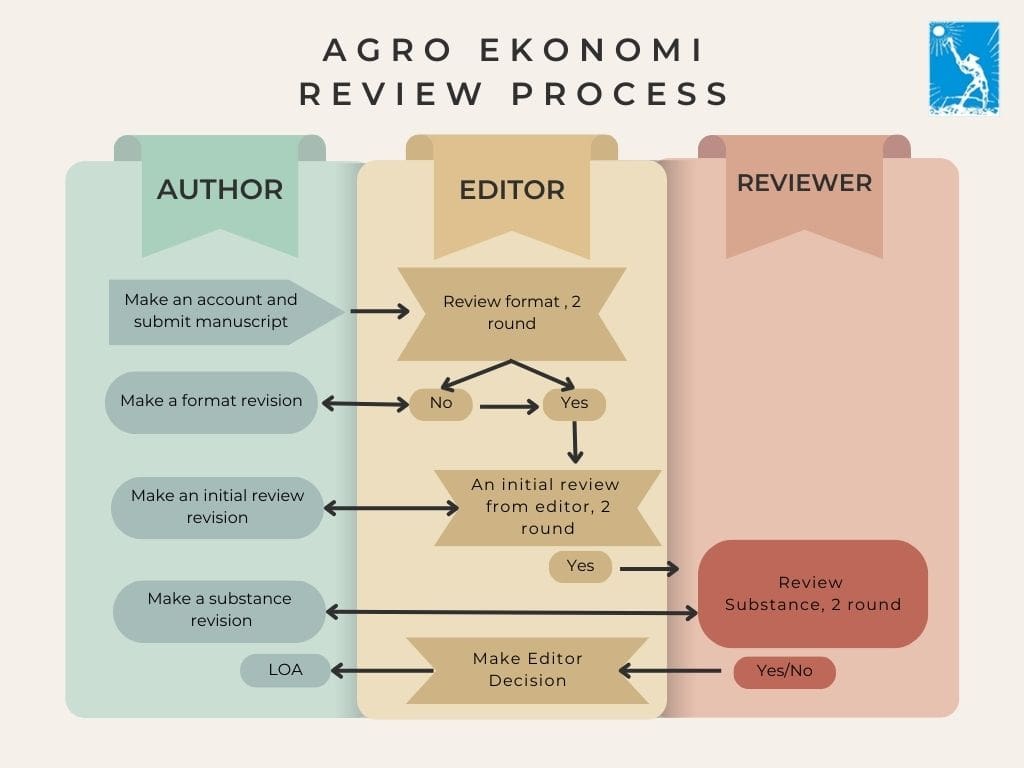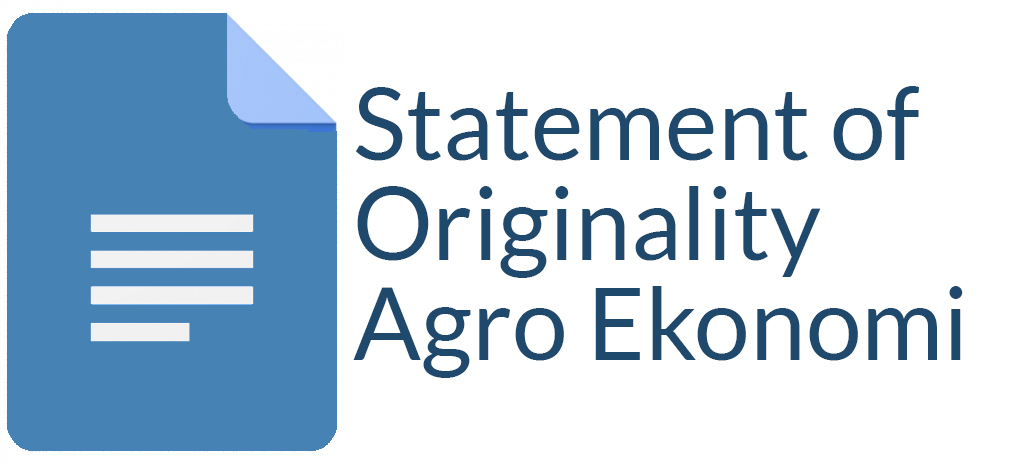Analysis of Household Income and Food Security of Watermelon Farmers During The Covid-19 Pandemic in Lamongan Regency
Annisa Annisa(1*), Berti Genia Dwi Saputri(2), Rosihan Asmara(3), Fahriyah Fahriyah(4), Nuhfil Hanani(5)
(1) Departement of Agricultural Socio Economics, Brawijaya University
(2) Departement of Agricultural Socio Economics, Brawijaya University
(3) Departement of Agricultural Socio Economics, Brawijaya University
(4) Departement of Agricultural Socio Economics, Brawijaya University
(5) Departement of Agricultural Socio Economics, Brawijaya University
(*) Corresponding Author
Abstract
The Covid-19 pandemic has disrupted the Indonesian economy in almost all sectors, including the agricultural sector. The government's policy for large-scale social restrictions has an impact on farmers' household income because it disrupts the access to sales of agricultural products. The low household income reduced opportunities to meet the needs of good quality food consumption, making food security difficult to achieve. Food security is reflected in two indicators, the level of energy adequacy and the proportion of household food expenditure. The aim of this research are to analyze income, food security and determinant factor of food security. The research was conducted in Trosono Village, Sekaran District, Lamongan Regency. It analyzed household food security using the Jonnson and Toole model. Further, factors influencing food security were analyzed using multiple linear regression analysis. This research found that (1) the average income of watermelon farming reached IDR 23,496,465 per hectare. Additionally, the research revealed that (2) watermelon farming households fell into the vulnerable (46.5%), the secure (23.2%), the insecure (20.9%), and the less secure (9.3%) categories. Finally, it was found that (3) several variables, such as the number of family members, the head of the family's education, income, rice expenditure, and maternal education, had a significant effect on the energy adequacy rate. The study reccomends farmers to hold technology counseling to increase their income, also there is a need socialization about the importance of regulating balanced, nutritious, and diverse food consumption patterns to increase mother knowledge to improve the nutritional status of their families.
Keywords
Full Text:
PDFReferences
Drammeh, W., Hamid, N. A., & Rohana, A. J. (2019). Determinants Of Household Food Insecurity And Its Association With Child Malnutrition In Sub-Saharan Africa: A Review Of The Literature. Current Research in Nutrition and Food Science, 7(3), 610–623. https://doi.org/10.12944/CRNFSJ.7.3.02
Kuwornu, J. K. M., Suleyman, D. M., & Amegashie, D. P. K. (2013). Analysis of Food Security Status of Farming Households in the Forest Belt of the Central Region of Ghana. Russian Journal of Agricultural and Socio-Economic Sciences, 13(1), 26–42. https://doi.org/10.18551/rjoas.2013-01.04
Lamongan Regency Food Security Service. (2020). Rancangan Akhir Rencana Kerja 2020. Https://Lamongankab.Go.Id/Documents/Dkp/4.%20RENJA%202020.Pdf.
Limi, M., Zani, M., & Selvi, S. (2021). Factors Affecting The Food Security of The Bajo Community Households In West Muna District During The Covid-19 Pandemic. Habitat, 32(2), 74–81. https://doi.org/10.21776/ub.habitat.2021.032.2.9
Mohamed, A. A. (2017). Food Security Situation in Ethiopia: A Review Study. International Journal of Health Economics and Policy, 2(311), 86–96. https://doi.org/10.11648/j.hep.20170203.11
Mulyo, J. H., & Widada, A. W. (2015). Households’ Food Security and Food Self Sufficiency in the Rural Marginal Area of Bojonegoro Regency. Agro Ekonomi, 26(2), 121–128. https://doi.org/10.22146/agroekonomi.17265
Ndhleve, S., Dapira, C., Kabiti, H. M., Mpongwana, Z., Cishe, E. N., Nakin, M. D. V., Shisanya, S., & Walker, K. P. (2021). Household Food Insecurity Status And Determinants: The Case Of Botswana And South Africa. Agraris, 7(2), 207–224. https://doi.org/10.18196/agraris.v7i2.11451
Purwaningsih, Y., Hartono, S., Masyhuri, M., & Mulyo, J. H. (2015). Pola Pengeluaran Pangan Rumah Tangga Menurut Tingkat Ketahanan Pangan Di Provinsi Jawa Tengah. Jurnal Ekonomi Pembangunan: Kajian Masalah Ekonomi Dan Pembangunan, 11(2), 236-253. https://doi.org/10.23917/jep.v11i2.327
Puspita, M. A. (2017). An Analysis of Farmer Household Food Security: Case Study in Patuk Village, Wajak, Malang Regency. Agricultural Socio-Economics Journal, 17(01), 16–22. https://doi.org/10.21776/ub.agrise.2017.017.1.3
Ruhyana, N. F., Essa, W. Y., & Mardianis. (2020). Sociodemographic Factors Affecting Household Food Security in Sumedang Regency West Java Province. AGRARIS, 6(1), 38–51. https://doi.org/10.18196/agr.6189
Safitri, A. M., Pangestuti, D. R., & Aruben, R. (2017). Hubungan Ketahanan Pangan Keluarga Dan Pola Konsumsi Dengan Status Gizi Balita Keluarga Petani. Jurnal Kesehatan Masyarakat (Undip), 5(3), 120–128. https://doi.org/10.14710/jkm.v5i3.17181
Saputro, W. A., & Fidayani, Y. (2020). Analisis Faktor-Faktor Yang Mempengaruhi Angka Kecukupan Energi Rumah Tangga Petani Di Kabupaten Klaten. Vigor: Jurnal Ilmu Pertanian Tropika Dan Subtropika, 5(2), 51–55. https://doi.org/10.31002/vigor.v5i2.3039
The Statistic Indonesian. (2020). Berita Resmi Statistik: Ekonomi Indonesia Triwulan II 2020 Turun 5,32 Persen. In https://www.bps.go.id/pressrelease /2020/ 08/05/173/-ekonomi-indonesia-triwulan-ii-2020-turun-5-32-persen.html.
Umbu, Y., Sabaora, O., Priyanto, S. H., & Prihtanti, T. M. (2021). The Food Security Of The Household Recipient Of Food Independent Village Program In Central Sumba Regency. SOCA: Jurnal Sosial Ekonomi Pertanian, 15(2), 334–344. https://doi.org/10.24843/SOCA.2021.v15.i02.P09
Utami, D. W. (2020). Ketahanan Pangan dan Ironi Petani di Tengah Pandemi COVID-19 - Pusat Riset Kependudukan BRIN. Https://Kependudukan.Brin.Go.Id/Mencatatcovid19/Ketahanan-Pangan-Dan-Ironi-Petani-Di-Tengah-Pandemi-Covid-19/.
Article Metrics
Refbacks
- There are currently no refbacks.
Copyright (c) 2018 Agro Ekonomi

This work is licensed under a Creative Commons Attribution-ShareAlike 4.0 International License.
View My Stats











